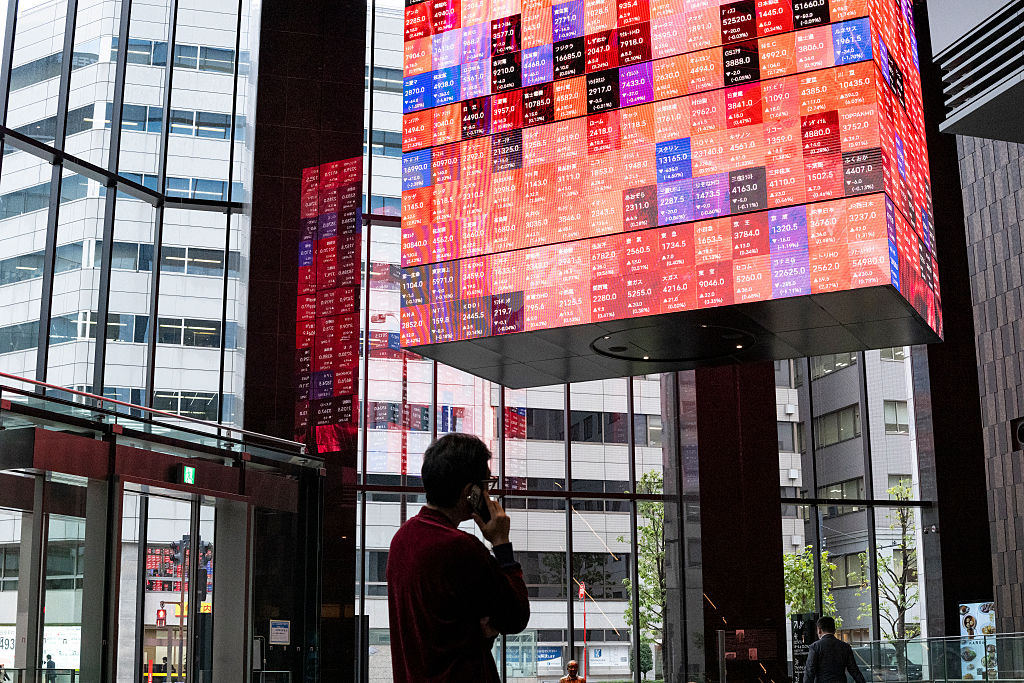
Get the latest financial news, insights and expert analysis from our award-winning MoneyWeek team, to help you understand what really matters when it comes to your finances.
You are now subscribed
Your newsletter sign-up was successful
Want to add more newsletters?
Japan’s politics are unstable, the yen is trading at multi-decade lows against most major currencies, long-term government bond yields have soared, and inflation is picking up again. Yet corporate Japan is doing just fine. Stocks are regularly reaching new highs and seem likely to continue upwards.
On a price/earnings ratio of about 16, the market’s valuation is at the top of its 10-year range but earnings growth is coming through strongly, says Masaki Taketsume, manager of the £370 million Schroder Japan Trust (LSE: SJG). The consensus for 2026 is for an average gain of 10%.
Rising interest rates, which are expected to reach nearly 2% over the next year, should benefit financials, he says. However, a weak yen means that exporters are expected to see most of the earnings growth. This is reflected in SJG’s portfolio of 60-70 stocks, which includes conglomerate Hitachi, Toyota Motor and electrical-equipment group Fujikura, as well as bank Sumitomo Mitsui and multinational insurer Tokio Marine as its largest holdings. There is a strong weighting to mid and small caps, which account for 47% of the portfolio, against 27% in the Topix index.
Try 6 free issues of MoneyWeek today
Get unparalleled financial insight, analysis and expert opinion you can profit from.

Sign up to Money Morning
Don't miss the latest investment and personal finances news, market analysis, plus money-saving tips with our free twice-daily newsletter
Don't miss the latest investment and personal finances news, market analysis, plus money-saving tips with our free twice-daily newsletter
Gearing of 13% of net assets show Taketsume’s optimism. A five-year return of 78% (60% over three years) is one of the best of the mainstream Japanese equity funds. Still, the shares trade on a 10% discount to net asset value (NAV).
The record of the £315 million CC Japan Income & Growth Trust (LSE: CCJI) is even better, at 91% over five years and 67% over three. Yet it also trades on an 8% discount. Its top 10 holdings include video games giant Nintendo, engineering group Mitsubishi Heavy Industries (Japan’s largest defence contractor) and tech investor SoftBank. With just 37 stocks, the CCJI portfolio is more concentrated than SJG.
Investments in Japan return to form
Until 2021, JPMorgan Japanese Investment Trust (LSE: JFJ), with £1.2 billion of net assets, and the £916 million Baillie Gifford Japan Trust (LSE: BGFD) led the sector by a mile, but their strong growth bias brought them crashing down to earth. Subsequently JFJ, with a three-year return of 67%, recovered much more quickly than BGFD (38%). However, their one-year returns of 24% are similar and about 5% ahead of SJG and CCJI. These two also trade on a discount of about 10%.
The improvement is partly due to growth returning to favour but also to some much-needed portfolio reorientation. “We had a lot less in cyclical stocks, such as carmakers and banks, so grew more slowly coming out of Covid, but that has changed in the last year,” says Matthew Brett, manager of BGFD. “There are lots companies in Japan which aren’t growing any more so we are having to look away from the index at mid-cap and smaller companies.”
SoftBank is BGFD’s largest holding – its investments in Arm and OpenAI are key to the AI story, says Brett. Rakuten (e-commerce), CyberAgent (digital advertising) and Bengo4.com (online legal services) are also AI beneficiaries. Video games should also be helped by AI, allowing them to be developed faster and more cheaply: Nintendo, Sega Sammy and Square Enix are all in the portfolio.
Pharmaceutical company Eisai has – in partnership with Biogen – the first approved drug for early Alzheimer’s disease. Robotics, an area of national strength – “Japan has a pressing need to manage a declining population” – also features, with Fanuc.
SBI, Japan’s largest stock brokerage, is the second-largest holding. It should capitalise on the growing popularity of the enhanced Nippon Individual Savings Account (Nisa), a tax-free vehicle modelled on the UK ISA. “With inflation coming back, putting money into the bank isn’t so smart any more. Real estate and the stockmarket should benefit.”
This article was first published in MoneyWeek's magazine. Enjoy exclusive early access to news, opinion and analysis from our team of financial experts with a MoneyWeek subscription.
Get the latest financial news, insights and expert analysis from our award-winning MoneyWeek team, to help you understand what really matters when it comes to your finances.

Max has an Economics degree from the University of Cambridge and is a chartered accountant. He worked at Investec Asset Management for 12 years, managing multi-asset funds investing in internally and externally managed funds, including investment trusts. This included a fund of investment trusts which grew to £120m+. Max has managed ten investment trusts (winning many awards) and sat on the boards of three trusts – two directorships are still active.
After 39 years in financial services, including 30 as a professional fund manager, Max took semi-retirement in 2017. Max has been a MoneyWeek columnist since 2016 writing about investment funds and more generally on markets online, plus occasional opinion pieces. He also writes for the Investment Trust Handbook each year and has contributed to The Daily Telegraph and other publications. See here for details of current investments held by Max.
-
 The rare books which are selling for thousands
The rare books which are selling for thousandsRare books have been given a boost by the film Wuthering Heights. So how much are they really selling for?
-
 Pensions vs savings accounts: which is better for building wealth?
Pensions vs savings accounts: which is better for building wealth?Savings accounts with inflation-beating interest rates are a safe place to grow your money, but could you get bigger gains by putting your cash into a pension?
-
 The rare books which are selling for thousands
The rare books which are selling for thousandsRare books have been given a boost by the film Wuthering Heights. So how much are they really selling for?
-
 What is physical AI, and how can you invest in it?
What is physical AI, and how can you invest in it?Artificial intelligence is increasingly taking physical form and could completely transform how we live. How can investors gain exposure?
-
 How to invest as the shine wears off consumer brands
How to invest as the shine wears off consumer brandsConsumer brands no longer impress with their labels. Customers just want what works at a bargain price. That’s a problem for the industry giants, says Jamie Ward
-
 In defence of GDP, the much-maligned measure of growth
In defence of GDP, the much-maligned measure of growthGDP doesn’t measure what we should care about, say critics. Is that true?
-
 A niche way to diversify your exposure to the AI boom
A niche way to diversify your exposure to the AI boomThe AI boom is still dominating markets, but specialist strategies can help diversify your risks
-
 New PM Sanae Takaichi has a mandate and a plan to boost Japan's economy
New PM Sanae Takaichi has a mandate and a plan to boost Japan's economyOpinion Markets applauded new prime minister Sanae Takaichi’s victory – and Japan's economy and stockmarket have further to climb, says Merryn Somerset Webb
-
 Early signs of the AI apocalypse?
Early signs of the AI apocalypse?Uncertainty is rife as investors question what the impact of AI will be.
-
 Reach for the stars to boost Britain's space industry
Reach for the stars to boost Britain's space industryopinion We can’t afford to neglect Britain's space industry. Unfortunately, the government is taking completely the wrong approach, says Matthew Lynn
